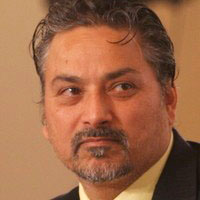Azhar Hussain | Pakistan

Azhar Hussain, Pakistan
As a Pakistani-American and a Muslim, Azhar Hussain has been personally affected by global extremism as well as sectarian violence in Pakistan. Today, he is leading a critical effort to equip the next generation with the knowledge and skills necessary for peace and reconciliation.
Azhar grew up in Pakistan, where he witnessed firsthand the influential role of the madrasa education system on Pakistani students and society. Madrasas, or religious schools, often provide room and board for children who cannot otherwise afford it, and groom them to serve as the future religious leaders of the country.
Formerly the Vice President for Preventive Diplomacy at the International Center for Religion & Diplomacy (ICRD), Azhar (known as Azi to his friends) headed the Madrasa Enhancement Program in Pakistan. In keeping with ICRD’s mission to address identity-based conflicts that exceed the reach of traditional diplomacy, Azi worked tirelessly to engage the Pakistani madrasa leaders and help them develop skills to be agents of peacebuilding, reduce violence, and provide improved opportunities for Pakistani youth.
On behalf of ICRD, Azi has worked in partnership with local Pakistani religious and civic organizations to design a system of comprehensive training programs for madrasa leaders that equips them with the skills necessary to facilitate these changes, and then to train other madrasa leaders to do the same. From 2004, Azi has conducted numerous training workshops, bringing together madrasa leaders from each of Pakistan’s five Muslim sects, often for the first time in their lives. Through his commitment to the Islamic principles of peace, tolerance, and reconciliation, Azi is laying the groundwork for sectarian harmony within Pakistan and for the reduction of global extremism. After his time with ICRD, Azi became the president of the Peace and Education Foundation (PEF), based in Islamabad. With PEF, Azi’s mission to change madrasa education continues.
In contrast to attempts by other parties to impose reforms on madrasas which are met with suspicion and hostility, Azi has found success by engaging madrasa leaders directly. Rather than criticizing the shortcomings of madrasa education and attempting to impose foreign values, Azi encourages madrasa leaders to reflect on their own values and goals. They explore ways they can work together to live up to the principles of Islam and provide improved moral guidance for their students and communities.
With PEF, Azi seeks to deepen the work of ICRD to include trainings for madrasa teachers and leaders while building on work with universities to develop certificate programs for madrasa teachers. PEF currently works with five universities and is looking to expand. The new organization also allows Azi to pursue writing curricula for indigenous peace education. Azi knows the importance of involving women in the PEF organization and has found that women are responsive to workshops and always willing to learn. The Azhar Hussain Vocational Centers for Madrasa Girls develops vocational centers for women.
Azi’s work exhibits a deeply held belief in the power of religion to heal, to motivate and to empower people to bring about powerful social change within their societies and the world at large. What drives his efforts to reform the madrasas is his conviction that religion can be a force for peace and unity rather than division and violence. The dangers involved in working for peace and reconciliation are many, and Azi’s unique capability to affect change carries with it severe risks. While some call for military action to confront the threat of violent extremism, Azi’s work is meeting an even greater challenge by engaging the highest values of religion in promoting peace.
Publications
Madrasa Enhancement and Global Security:
A Model for Faith-based Engagement
ICRD Monograph, 2009
Madrasas and the ‘Global War on Terror’
Conflict Prevention and Resolution Forum, 2006